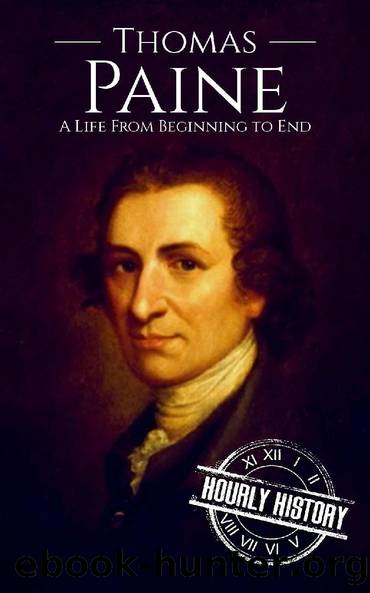Thomas Paine: A Life from Beginning to End by Hourly History

Author:Hourly History [History, Hourly]
Language: eng
Format: epub
Publisher: Hourly History
Published: 2019-06-03T00:00:00+00:00
Chapter Seven
The Age of Reason
âThe idea of hereditary legislators is as inconsistent as that of hereditary judges, or hereditary juries; and as absurd as an hereditary mathematician, or an hereditary wise man; and as ridiculous as an hereditary poet-laureat.â
âThomas Paine
Shortly before Thomas Paine arrived on French shores, the French had already shown their esteem for Mr. Paine by making him an honorary French citizen. Upon arrival, he was then given the rare distinction of being appointed to the French provisional governing body known as the National Convention.
However, things were not going well for Revolutionary France. Not long after the imprisonment of their former king, Louis XVI, the National Assembly had launched a war against Austria and Prussia and were being soundly defeated on the battlefield with Paineâs old friend Lafayette becoming a prisoner of the Austrians. The mobs that Edmund Burke had warned about were meanwhile wreaking havoc all across France, killing anyone deemed to be a counterrevolutionary. As a newcomer who barely spoke French, Thomas Paine was mostly ignorant of much of these happenings, still tending to view the revolution as a success.
With King Louis XVI languishing in a prison cell, the French provisional government abolished all the trappings of monarchy, officially proclaiming France as a republic on September 22, 1792. Thomas Paine was granted a position on the panel given the task of creating this new republicâs constitution. One of the first major questions of the republic was: what would happen to the former French king? The political wing called the Jacobins sought to have King Louis executed while more moderate factions opposed the death penalty.
Paine sided with the moderates, arguing that Louis should be merely exiled. He even came up with a plan of exiling Louis to America, but the Jacobins, who believed Louis to be actively seeking to stage an uprising against the fledgling republic, found such a notion to be a complete anathema. Taking that risk into account, the governing body ultimately voted to kill the former ruler, and Louis XVI was beheaded by way of the guillotine just a few days later on January 21, 1793.
With the king dead, the governing body installed in his place continued its international conflicts and actually widened the war by engaging Holland, and even Paineâs own native Britain. Paine grew increasingly disillusioned with these developments and considered leaving France for America. He knew, however, that there was a real possibility of his capture if the British Navy happened to intercept his ship as he crossed the Atlantic.
So it was that Thomas Paine, despite his misgivings, decided to stay in France. It was then that Paine saw his worst fears crystalize into reality as the Jacobins transformed the revolution into a despotic totalitarian regime. These measures were deemed to be necessary in order to stave off complete chaos. To the Jacobinsâ credit, their seizure of power allowed for a massive mobilization of the army that brought France back on the offensive in what had been a faltering fight against multiple enemies.
Download
This site does not store any files on its server. We only index and link to content provided by other sites. Please contact the content providers to delete copyright contents if any and email us, we'll remove relevant links or contents immediately.
Blood and Oil by Bradley Hope(1558)
Wandering in Strange Lands by Morgan Jerkins(1416)
Ambition and Desire: The Dangerous Life of Josephine Bonaparte by Kate Williams(1383)
Daniel Holmes: A Memoir From Malta's Prison: From a cage, on a rock, in a puddle... by Daniel Holmes(1324)
Twelve Caesars by Mary Beard(1312)
It Was All a Lie by Stuart Stevens;(1294)
The First Conspiracy by Brad Meltzer & Josh Mensch(1166)
What Really Happened: The Death of Hitler by Robert J. Hutchinson(1154)
London in the Twentieth Century by Jerry White(1145)
The Japanese by Christopher Harding(1129)
Time of the Magicians by Wolfram Eilenberger(1125)
Twilight of the Gods by Ian W. Toll(1112)
A Woman by Sibilla Aleramo(1092)
Cleopatra by Alberto Angela(1091)
Lenin: A Biography by Robert Service(1072)
John (Penguin Monarchs) by Nicholas Vincent(1068)
Reading for Life by Philip Davis(1023)
The Devil You Know by Charles M. Blow(1023)
The Life of William Faulkner by Carl Rollyson(979)
